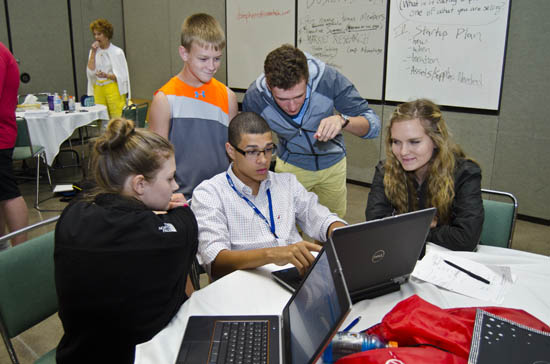E-Discovery Challenge shaping next generation of entrepreneurs
E-Discovery Challenge shaping next generation of entrepreneurs

At one time, the three Rs were considered the solid foundation of any education. Now add a new letter to that list of reading, ‘riting and ‘rithmetic—the letter E, which represents a new curriculum-based program, E-Discovery. While the E in E-Discovery stands for entrepreneur, it also wraps encouragement and enterprise into a program for students in elementary through high school.
The University of Kentucky’s E-Discovery Challenge is designed to teach entrepreneurial skills and business development in K-12 classrooms and other settings. It has all the components of 21st Century Learning skills that educators and employers believe are critically important to success.
The program originates from the UK College of Agriculture, Food and Environment’s Department of Community and Leadership Development, and is an outgrowth of the successful Kentucky Entrepreneurial Coaches Institute that was housed in the department.
Small businesses command an overwhelming share of the American economy, according to the U.S. Census Bureau. In 2011, the most recent year for which data is available, companies that employed fewer than 20 workers made up 89.8 percent of all employer firms in the country. Though some people have looked toward building a large manufacturing presence in economically hard-hit areas of the state, opportunity for more local employment and success often lies with small-business owners.
Educators who recognized the importance of introducing students to entrepreneurial opportunities early developed E-Discovery. With that in mind, program leaders are training teachers to incorporate the curriculum into their classes.
“The key to the success of E-Discovery Challenge in the classroom has been the amazing teachers we have trained to teach the curriculum alongside their content areas,” said Melony Denham, E-Discovery project manager.
In Bullitt County High School back in the spring, Marla Morris’s advanced marketing class spent nine sessions developing their own small businesses. Wrapping the E-Discovery Challenge curriculum into her lesson plans, Morris introduced her students to the creativity and business acumen needed to get a small business off the ground. Working in teams, her students developed businesses that created a variety of products, such as food products, home décor items and smart phone cases. Each team had to develop a business plan that included an executive summary, a company description, key personnel, an industry overview, a market plan, a cost analysis, a contingency plan, return on investment, vision and mission statement.
“Students are challenged, excited and motivated as they work in teams to develop their ideas,” Denham said. “Increased self-confidence, a can-do attitude, leadership skills and understanding what it takes to start a business are just a few of the many outcomes we have seen from this initiative.”
This isn’t just a homework assignment to be turned in on paper. The teams were required to find the funding, produce their products and then sell them at an arts fair in their school’s gym on a Saturday in May.
“I want them to put their money where their mouth is, because it didn’t get real until they actually had to do it,” Morris said. “I wanted it to be like real world.”
Morris’ students learned quite a bit from the exercise, things like target markets and preparation. Jace Wilson and Stephanie Mata learned about supply and demand. The candle logs that Wilson made were turning out to be pretty popular, but they hadn’t made enough to meet demand. Wilson estimated it took between two and three hours to make each candleholder, which limited the amount they had on hand to offer customers.
This summer, 22 high school sophomores and juniors from 18 counties gathered at the Center for Rural Development in Somerset for a weeklong immersion in the E-Discovery Challenge curriculum. This time it was the Entrepreneurial Leadership Institute using the E-Discovery curriculum. Led by Denham, Ann DeSpain, a retired Maysville teacher who is now an E-Discovery consultant, and Delaney Stephens, youth programs coordinator and community liaison with the center, the students arrived mid-day on a Monday, and by Tuesday afternoon had settled into teams and were deep into planning and establishing their businesses.
“We’re really trying to encourage them that entrepreneurship is a viable career option,” Stephens said. “This is so important. We shouldn’t have to teach our kids that they need to be doctors or lawyers and then go off to find a good job in a bigger city. We need to be teaching them how to solve problems that relate to Southern and Eastern Kentucky. The point is to get them excited about it, get them thinking about it.”
For Denham, there is another outcome from the program.
“Hope. That is the word that first comes to my mind that E-Discovery provides for students,” she said.
Funding for E-Discovery is made possible by the Appalachian Regional Commission, a federal-state partnership that works with the people of Appalachia in 13 states to create opportunities for self-sustaining economic development and improved quality of life. Financial support from the UK Department of Community and Leadership Development has allowed for program expansion, including into areas outside the Appalachian region. In addition, the department provides support for technical assistance, content, processes and evaluation.
Community Development



